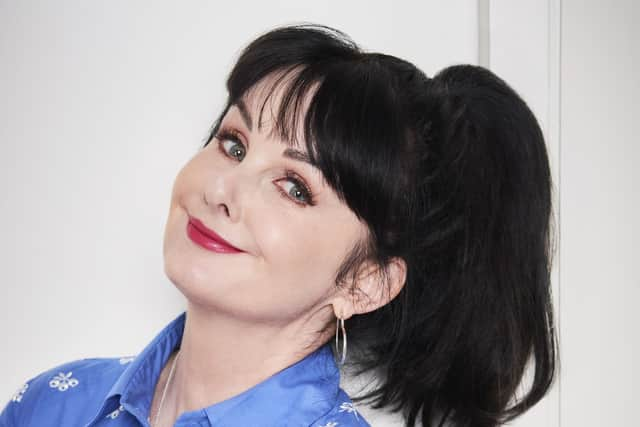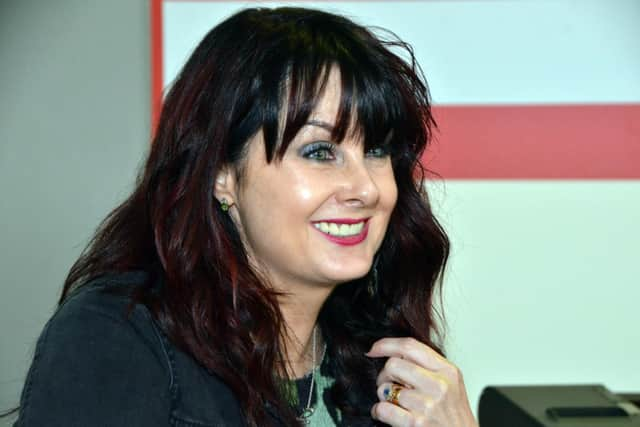Best-selling author Marian Keyes on celebrating her sobriety and turning 60
She may call herself an “ordinary alcoholic” – but there is nothing ordinary about global bestselling novelist Marian Keyes, whose contemporary tales of relationships, family and the ups and downs of life have earned her millions of fans. In January, she celebrated 30 years of sobriety, feeling “pride, pleasure and delight”, posting a heartfelt Instagram message to those who are struggling with alcohol issues.
Today, she openly admits that she still goes to support meetings regularly.
Advertisement
Hide AdAdvertisement
Hide Ad“I’m just an ordinary alcoholic, trying my best to stay sober one day at a time,” she says. “It doesn’t go away. It’s not like, you have cancer and then you get cured and you’re grand. But [meetings] work for me.” There are other landmark anniversaries and events – a portrait of her was recently unveiled at the National Gallery of Ireland, she’s about to celebrate 30 years as a published author and last year she turned 60, although she doesn’t feel her age, she insists.


“I felt fine at the time because I’ve never minded about getting older. I’ve always felt that as I’ve got older, life has got easier in terms of what people expect from women. Becoming invisible has definitely got a lot going for it.
“I’ve felt weird in that I feel much younger than 60 and in a way that my life is still waiting to start. I realise that people don’t grow out of this. I think one day I’ll feel like I’ve arrived. Sixty was the age that women were put out to grass, 60 sounds older than it actually is. It’s not what it was 30 years ago. You know, it’s youthful now. Between HRT and the fish oils, I feel younger than 60.”
Next year she will celebrate 30 years since her debut novel, Watermelon, was published. Her array of bestselling novels since then includes Rachel’s Holiday, Grown Ups and This Charming Man. Keyes has gone through huge peaks and troughs since Watermelon was published, including periods of clinical depression when she was unable to sleep, read, write or talk, and tried many therapies – both conventional and alternative.
Advertisement
Hide AdAdvertisement
Hide AdShe’s also gone through the menopause which she describes as “awful”.


“I was 45 when the perimenopause started. The anxiety was horrific, like, what was going on? It was really scary and it was the emotional stuff rather than the physical stuff that I found difficult – the mood swings, the fear, the anxiety, the rage. I felt way too young.
"I got HRT, but it took a while to get it right. I was lucky that the woman I went to wasn’t one of these menopause deniers. But I’ve encountered it since, the doctors who are reluctant to prescribe it, telling me ‘There’s no need for it, women have done this for centuries’.
"Yeah, and for centuries there weren’t antibiotics either, people died from the flu. There was no such thing as an anaesthetic, so if you needed your leg amputated it was no fun.”
Advertisement
Hide AdAdvertisement
Hide AdToday, though, she feels positively grateful for all that she has, both in her career and her personal life.
Keyes, who lives in Dublin with her husband Tony Baines, seems genuinely flummoxed as to why her novels – contemporary romantic tales peppered with her trademark wit, but often covering heavier themes including addiction, depression and bereavement – have become multimillion sellers that have stood the test of time.
“I can only go on what other people tell me, that I write with warmth, and I’m truthful, honest and authentic in my characters and people find that comforting.”
Her latest book, My Favourite Mistake, sees fortysomething Anna Walsh – one of the sisters in the Walsh family, as featured in some of her previous novels – throwing away her dream life and high flying career as a beauty PR executive in New York, and ditching her partner, to return to friends and family in Ireland.
Advertisement
Hide AdAdvertisement
Hide AdHer sister, recovering alcoholic Rachel – as featured in Rachel’s Holiday and Again, Rachel, a nod to Keyes’ own experience of alcoholism – plays a supporting role in this tale.
She recalls the moment she realised that Baines, her husband of almost 30 years, he was ‘the one’.
“It was eight months after we started spending time together, and he came to collect me from work. I remember waiting at the door, the rain had just stopped. And he appeared round the corner, right on time. I was looking at him thinking, ‘He’s beautiful, and he’s lovely to me and we have so much fun’.
"That was it. He didn’t let me down. He’s reliable, he’s kind, he’s clever,” she continues. “He is very different to me. He is whatever the opposite of an addict is. He’s moderate in his habits. But in other things, we are very aligned on our views on the world.”
Advertisement
Hide AdAdvertisement
Hide AdThey have both changed, she says, and have accommodated each other’s paths in life. Tony, for instance, loves climbing “Everest-style mountains”, Keyes explains, and she wouldn’t dream of stopping him.
As for turning 60, she says she doesn’t particularly take better care of herself physically.
“I’m rubbish at it. We’re supposed to be lifting weights and making our bones strong and eating a particular diet. Well, I don’t. I eat far too much chocolate and sweets. The only exercise I do is I run on a treadmill because it makes me feel happy.
"And every time I do it, I say that the next time I exercise I’m going to be doing the weights, the sit-ups, the whole business with the bone strengthening, but when it comes to it I think I’d rather just run.”
Advertisement
Hide AdAdvertisement
Hide AdShe runs around 8km every other day, having started during lockdown. “It kept my head straight and my body anxiety-free.”
Keyes says she no longer feels herself slipping into depression because she looks after her mental health better and has learned to say no. “I’m not going there again. It was awful and I don’t think I’d have the stamina to survive another go.”
My Favourite Mistake by Marian Keyes, Penguin Michael Joseph £22
Comment Guidelines
National World encourages reader discussion on our stories. User feedback, insights and back-and-forth exchanges add a rich layer of context to reporting. Please review our Community Guidelines before commenting.